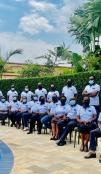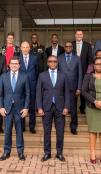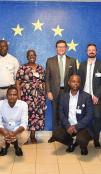Border communities confident on curbing COVID19 with Team Europe’s support

Congolese border officials and communities are confident on curbing the spread of COVID-19 following the rollout of a European Union funded initiative in partnership with the International Organization for Migration (IOM), the United Nations Migration Agency, and TradeMark East Africa, a non-governmental organization working to improve East African trade.
The intervention is supporting the preparedness and response efforts by the Congolese government.
The project is part of the overall Team Europe response to COVID-19 in Rwanda and the Central African region.
Team Europe is a support package launched by the EU in April 2020 to support partner countries in the fight against the coronavirus pandemic and its consequences by combining resources from member states, and financial institutions.
With the support expected to include Rwanda, the overall EU Delegation’s development support to the East African Nation is valued at over €50 million to support, in addition to contributions from EU member states.
Beneficiaries, such as Congolese border officials and communities say that following the interagency training conducted by IOM, they have been able to adopt the right practices and attitudes in dealing with community members amid the pandemic.
- Grace Bidigu, Port health officer, says that the training has motivated her to adopt the right attitude towards travelers.
- Abeli Mutuza, Port health officer, is pleased that the training has had a multiplier effect with the understanding of strict hygiene measures to be adopted to contain the spread of the disease; she was able to raise awareness of her family and, the family being the foundation of the community, the knowledge has been passed on to the community too.
- David Kanoo, Immigration officer, stated that the training has cleared misconceptions he had on the COVID19 pandemic and he now feels more confident to serve travelers.
- Together, Kapanga Masengu immigration officer and Wabusala Itongwa, port health officer participated in the training session organized by IOM and agreed that no agency can respond to the COVID19 pandemic on its own; that the training has brought all the agencies operating at the border closer and has allowed them to better understand the complementarity of each one’s role in managing the information of a traveler.

Nature of intervention
The support is an extension of a pre-COVID19 Integrated Border Management (IBM) intervention funded by the European Union which was working to establish a one-stop border post (Bukavu/Rusizi) to facilitate easy trade and movement between the countries.
In light of the pandemic, the three partners adjusted their support to include improving COVID-19 preparedness and response, specifically in reinforcing disease surveillance and prevention activities at the Rusizi/Bukavu Point of Entry and mitigating the impact of the outbreak.
Alvina Samjawon a Senior Regional Programme Manager at the IOM says that the EU funded initiative is conducting training to boost the confidence of frontline responders in Bukavu and also provides community support.
“It is about improving the health and safety of everyone. This involves ensuring that there is an understating of what COVID-19 is, how to protect yourself and people you interact with based on their context and their environment. Ultimately, the training and support will allow for more streamlined processes with everyone working as a team at the Point of Entry” Samjawon said.
Process:
The specific intervention was developed following an assessment in Bukavu to establish gaps and challenges to tailor-make the intervention.
Through the assessment, IOM identified key priorities such as the development of an integrated public health emergency management plan, joint capacity building for frontline border officers to respond to health emergencies as well as specialized training for port health and provincial health care providers.
For the community who uses the border point in their day to day lives, it emerged that there was a need for the adoption of a tailored risk communication strategy targeting the community and other groups at risk, especially women cross border traders and truck drivers.
Key highlights of the initiative according to Alvina Samjawon include:
The initiative seeks to support institutions and communities: Following the rapid assessment, the initiative identified the need to build capacities of border officials as well as the communities using the border.
Capacity building and training: The capacity building intervention for institutions and communities will ensure that there is an understanding of COVID-19, its effects, transmission, and how to handle emerging cases and contain the spread of the virus within border communities.
Tailor-made interventions: While the needs of Bukavu and Rusizi might be somewhat similar, the implementers of the initiative have ensured that each training and capacity building intervention is tailor-made to address the needs and demands of each location to improve efficiency.
Social support: The pandemic has posed a threat to livelihoods of some of the community’s members such as cross border women traders, traders and truck drivers as they heavily rely on cross border movements. The EU funded initiative has responded to the channel by intensifying risk communication to the said groups as well as border agencies to reduce their vulnerability.
In line with Governments’ efforts: This intervention is in line with the Governments of Rwanda and DRC COVID-19 national plans and is being implemented in close coordination with the other UN agencies and development partners that are supporting the COVID-19 response and efforts of both Governments.





